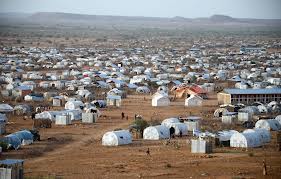Five Reasons hindering the return of Somali refugees from Kenya!

 Kenya has given the United Nations three months to remove a camp housing more than 500,000 Somali refugees as part of a get-tough response to the killing of 148 people by Somali gunmen at a Kenyan university.
Kenya has given the United Nations three months to remove a camp housing more than 500,000 Somali refugees as part of a get-tough response to the killing of 148 people by Somali gunmen at a Kenyan university.
It is understandable that the Government and the Kenyan population have frustrations over the situation they face after Garisa attack and answer to this, Deputy President William Ruto said in a statement on Saturday
“We have asked the UNHCR to relocate the refugees in three months, failure to which we shall relocate them ourselves”.
The Dadab Camp is the world’s largest refugee camp and was first established in 1991 when civil war broke out in Somalia and over subsequent years received waves of refugees fleeing conflict and drought. The camp also has houses, schools, clinics and community centres.
Last Tuesday, Kenya closed 13 informal money remittance firms, hawalas, to cut off funding to suspected radicals.
This isn’t the first time that Kenya is demanding such repartition:
In February 2013 at the London Conference of Somalia, the Kenyan President Mwai Kibaki first suggested that it was time to start looking at the repatriation of over half a million Somali refugees from Kenya back to “safe” southern areas of Somalia. Specific attention was paid to Dadaab which he said posed a “growing and serious security threat to Kenya and the region”.
The Kenyan government had also sought the closure of Dadaab after the September 2013 Shebaab attack on the Westgate shopping mall in Nairobi that left at least 67 people dead.
Knowing all this, here is Five Reasons hindering the return of Somali refugees from Kenya:
1. Humanitarian Issue: The refugees in Kenya Can’t come back to Origin Country because of fear and lack of security in Somalia and there are no third countries that can absorb such numbers of people, even the traditional country that resettles refugees like United States, Canada, Australia, New Zealand, Belgium, the United Kingdom, the Netherlands, Sweden, Denmark, Norway, Germany, Ireland, Italy, Switzerland and Finland, so Kenya has to respect the humanitarian situation of the refugees.
2. Kenya and International Treats: Kenya is party to many international treaties, including UN General Assembly, Convention Relating to the Status of Refugees, 28 July 1951, United Nations, 1949 Geneva Conventions and their 1977 Additional Protocols as well as the 1998 Statute of the International Criminal Court, so Kenya has to respect the international treaties to gain good standing in the global arena.
3. Tripartite Agreement: After months of fitful negotiations, the governments of Kenya and Somalia, and the UN Refugee Agency (UNHCR) on 10 November signed a Tripartite Agreement outlining procedures and legalities for the voluntary repatriation of hundreds of thousands of Somali refugees who have been living in Kenya for up to 22 years., Both Governments participated in the meeting of the High Commissioner’s Global Initiative on Somali Refugees in Addis Ababa and the process is underway, so Kenya has to respect that Tripartite Agreement.
4. To Ease the Political pressure: Political pressure mounted on Kenya’s president and his Deputy W. Ruto with scathing editorials and growing anger at a seven hour delay in the deployment of a special forces unit that eventually ended the bloody siege at Garissa University last week, according to analysts the call to remove the refugees is merely a PR exercise to ease the pressure and when normalcy returns in a few months time, Kenyan leaders are likely to abandon the idea of relocating the refugees as it was the case 2013 West Gate mall siege which Kenya said it will dismantle the refugee camps but was never materialized.
5. In the face of war on Terror: Kenyan President Uhuru Kenyatta on Friday held talks with a team of the US Senate and the Congress at Kenya’s State House in Nairobi. According to Daily Nation, the U.S team headed by Senator Kirsten Gillibrand met the Kenyan head of state to discuss the war against terror, regional security, US and other Western states are likely to oppose the relocation of the refugees and Kenya would all probability seek financial assistance in exchange in the name of fighting terror.
Goobjoog News